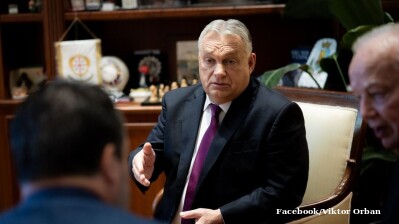Viktor Orban facing delicate balancing act to persuade Donald Trump to ease pressure on Hungary over Russian sanctions

US President Donald Trump is scheduled to meet Hungarian Prime Minister Viktor Orban on November 8, though the location of the talks has yet to be confirmed, Bloomberg reported on October 29. According to local analysts, Orban will try to persuade Trump to ease the pressure on Hungary from decoupling from Russian fossil fuel at least until the April election.
Foreign Minister Péter Szijjarto said earlier this week that the Hungarian premier would hold talks with Trump next week to discuss ways to shield Hungary from the effects of the latest US sanctions targeting Russia’s two largest oil groups. The measures had so far had no impact on Hungary’s Russian energy imports, he added.
Speaking in Rome, Orban said he was "particularly interested in finding a workable system for the Hungarian economy," noting that Hungary was heavily dependent on Russian oil and gas, without which prices would skyrocket and there would be severe supply shortages.
Hungary continues to rely on Moscow for most of its oil and gas imports, in contrast with many EU member states that have sought to reduce their dependence since Russia’s full-scale invasion of Ukraine.
The Hungarian government has argued that its geographic position leaves it little alternative but to rely on Russian energy, though it could also import oil via the Adriatic pipeline.
US Ambassador to NATO Matthew Whitaker rejected Hungary’s arguments in a Fox News interview on October 26 saying the country had still "not made any active steps" to end its dependence on Russian oil. He added that Washington would continue to work with Hungary and its neighbours, including Croatia, to help diversify energy sources.
Hungary’s MOL and Croatian state-owned Janaf had been in dispute over the viability of supplies. Local analysts note that the lack of political will from Budapest is hindering an agreement with Zagreb. Government officials also warned that relying on a single channel of supply poses security risks for Hungary.
Preparations for the upcoming Trump-Orban meeting are under way. Hungary is also seeking to restore the double taxation avoidance agreement between Hungary and the United States, Index.hu writes after the Secretary of the Economy Ministry held discussions in Washington with senior officials of the US Department of the Treasury.
In a separate article, independent Hvg.hu highlighted a BBC report by the broadcaster’s Budapest-based correspondent, published under the telling headline “Orban’s dilemma: Russian oil or Trump’s favour”.
The Hungarian prime minister, whom Trump has publicly praised as a "great leader", and who has long enjoyed admiration from MAGA circles, finds himself at odds with the US president for the first time over a matter of strategic and economic significance, Nick Thorpe writes.
According to the report, Orban hopes the Washington meeting will ease US pressure ahead of next year’s Hungarian election, where energy security and the cost of living will be a major campaign issue. Europe’s longest-serving prime minister and his nationalist Fidesz party is trailing in most polls behind an opposition challenge led by former Fidesz cadre Peter Magyar.
While Trump is likely to push for stronger action from Budapest, Orban faces a difficult balancing act: maintaining his stance on cheap Russian energy while preserving his close ties with his ally in the White House.
The BBC story noted that the Czech Republic, which faced similar geographic and technical challenges, has already eliminated Russian oil imports after upgrading its Transalpine pipeline link to Trieste and adapting refineries to process non-Russian crude.
The Hungarian government warned that weaning itself off Russian crude and gas would lead to skyrocketing prices, but that argument is undermined by the Czech example as there is no data that Czech consumers have to pay more, the BBC concludes.
News

Nigeria's Heirs Energies' CFO on powering growth via sustainable, indigenous-led development
NewsBase speaks exclusively to Samuel O. Nwanze, Executive Director and Chief Financial Officer of Nigerian indigenous integrated oil and gas company Heirs Energies.

Brazil's Lula "horrified" as Rio police raid death toll reaches at least 130
Brazilian President Luiz Inácio Lula da Silva expressed shock at the fatalities from a massive police operation targeting Rio drug gangs that left scores dead, while residents and rights advocates accused authorities of summary executions.

Nigeria's NNPCL weighs technical equity partnerships to revive idle state-owned refineries
NNPCL is reviewing options to bring the Port Harcourt, Warri and Kaduna refineries back into meaningful operation, possibly by bringing in technical equity partners to upgrade or repurpose units.

Situation critical in Ukraine’s frontline key logistics hub Pokrovsk
Russian infantry units have breached Ukrainian defensive lines and entered the key eastern logistics hub of Pokrovsk, sparking intense street fighting and threatening to encircle Ukrainian forces as the situation becomes "critical."



